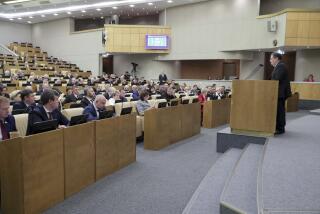‘Russia First’ Program Announced by Yeltsin : Autonomy: He plans to cut off funds for some central government agencies. And republic will issue currency.
- Share via
MOSCOW — Russian Federation President Boris N. Yeltsin, seeking to propel the Soviet Union into full-scale economic reforms, declared Tuesday that his republic, the country’s wealthiest, will stop financing central government ministries and state-owned enterprises it regards as unnecessary or uneconomic.
Yeltsin also said that Russia, worried about the drain by other republics on its resources, will soon issue its own currency and pursue what increasingly is emerging as a “Russia first” policy.
The country’s economic transformation must not be delayed any longer, and the difficult first steps, including sharp price increases and the closure of unprofitable enterprises, must be taken immediately, Yeltsin told the Russian State Council.
“People will suffer, but we have to go through this,” Yeltsin said, speaking of the price increases that will begin next month and continue into January. “All were unanimous in the opinion that this move is a must.”
But he also warned that the central government’s ministries, huge bureaucracies that have lumbered on despite all the attempts at economic reform, and the thousands of unprofitable state enterprises will be closed as part of the reforms.
“In one month, we are closing all the bank accounts of (Soviet) Union ministries whose services we’re not using,” Yeltsin declared in a television interview. “Let them know this today.”
Although Yeltsin’s authority for such action was not clear, there was no doubt of his determination to reshape the Soviet Union, politically and economically, so that Russia emerges dominant.
“Before launching the reforms, the president of Russia is going, in his own words, to complete the destruction of the center,” Russian Television said in its report on the State Council meeting.
And, despite the warnings of most reform economists against separate currencies to replace the Soviet ruble, Yeltsin promised to issue “a national currency, our own currency.”
Its intent plainly is to ensure Russian domination of the “economic community” that will be formed to maintain a common market among most of the Soviet republics.
Yeltsin complained that other republics, notably the newly independent Baltic states of Estonia, Latvia and Lithuania, are buying up food and other scarce commodities with large amounts of rubles, draining Russia of what it badly needs for itself and driving up prices.
Although Yeltsin has pledged that Russia will sign an economic treaty with nine other Soviet republics on Friday, the Russian state secretary, Gennady E. Burbulis, said 17 related agreements on trade and cooperation must be settled before ratification.
To carry out the envisioned reforms, Yeltsin said he will replace the present Russian government shortly, appointing a new prime minister and forming a new Cabinet committed to radical transformation.
“This must be a transitional government, a government of national confidence,” Yeltsin said. “There must be a united team.
“Many present members will be reappointed, but also some people undoubtedly will be replaced,” he told Russian Televison. “The most important thing is that almost one-half of the ministries will be reduced in size.”
Burbulis, Yeltsin’s closest aide, told lawmakers that urgent action is needed on the economy. “The conclusion of the State Council . . . is that it is necessary in coming days to end debate and set up an effective Council of Ministers capable of implementing unpopular but extremely necessary measures,” Burbulis said.
Sergei B. Stankevich, a member of the Russian State Council, said that the political character of the Cabinet, originally chosen in July, 1990, will change, with conservatives replaced by proven reformers and all committed to Yeltsin’s program.
More to Read
Sign up for Essential California
The most important California stories and recommendations in your inbox every morning.
You may occasionally receive promotional content from the Los Angeles Times.













